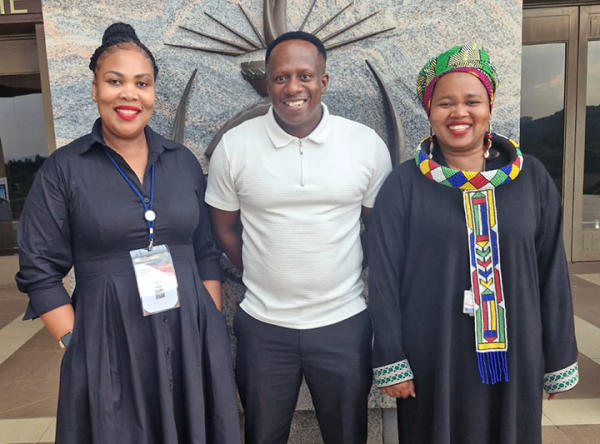
Towards the leading College of Law and Justice in Africa
At the 10th Annual Law Conference, Unisa once again affirmed its leadership in the national higher education sector with the presentation of a compelling paper titled “An AI-Responsible Governance Framework to Safeguard and Deploy AI-Based Solutions at an ODeL University.”
Presenting the paper were Marothi Phillip Lemekwane from ICT Governance, Dr Khanyisile Twabu from the ICT Academy of Applied Technologies and Innovation, and Abongile Moloi from the Office of the Vice-Principal: Strategy, Risk and Advisory Services. The session provided in-depth insights into how artificial intelligence (AI) is transforming the education sector and Unisa’s progress in shaping a fit-for-purpose AI governance policy.

From left: Presenters Abongile Moloi, Marothi Phillip Lemekwane, and Dr Khanyisile Twabu
Navigating the global AI landscape
The presenters highlighted Unisa’s deliberate, thoughtful approach in navigating the global AI governance landscape. Through comparative insights into the EU’s AI Act, the United States’ innovation-first model, the emerging national AI strategies from Southern African countries such as Namibia and Zambia, and South Africa’s National AI Policy framework published in 2024, the team presented an AI-responsible governance framework that is both globally aware and locally grounded, emphasising the importance of AI regulations and AI contextualisation as key differentiators acknowledging that AI governance is not a one-size-fits-all framework. They also referenced the African Union’s Pan-African AI strategy and ethics guidelines, positioning Unisa as an active contributor to the continental AI governance conversation.
As South Africa’s leading comprehensive open and distance eLearning (CODeL) university, Unisa has not only been proactive in developing its own AI Policy and Guidelines, which is now nearing approval, but has also become a sought-after adviser for other institutions across the region. The team highlighted that several universities have turned to Unisa for guidance, a testament to the institution’s enduring role as a pillar of research and innovation leadership.
Challenges and risks presented by AI
Importantly, the team did not ignore the challenges and risks associated with AI, particularly in the area of cybersecurity, privacy, ethics, and skills shortage. They emphasised that with AI integration comes a growing need for vigilance, both at the institutional and individual levels. They advised participants to be extremely cautious and mindful, reminding everyone of the crucial link between POPIA compliance, data privacy and responsible digital conduct. The team emphasised the importance of walking the AI journey with staff, highlighting the importance of learning, unlearning and re-learning. They positioned AI as a tool to augment and not replace teaching and learning thus cementing the importance of pedagogy before technology.
Unisa staff, first line of defence
Unisa’s ICT portfolio is reportedly ramping up its cybersecurity measures, advocating for stronger infrastructure, early threat detection systems, and user-awareness campaigns. While the detailed framework for AI governance is reserved for a soon-to-be-published academic article, presenters stressed that part of the mitigation strategy includes empowering staff with the knowledge they need to function as the first line of defence.
A path forward
The message from the presenters was clear: innovation without protection is not progress. As Unisa finalises its AI policy, the institution continues to lead with both courage and caution, crafting a governance framework that is context-specific, ethically anchored, and forward-looking. As South Africa marks 30 years of democracy, Unisa’s work ensures that AI becomes a force for inclusion, embracing the weight of the past, push of the present and pull of the future.
* Submitted by Ngwako Mokgotho, Communication and Marketing Specialist, College of Law
Publish date: 2025-04-15 00:00:00.0